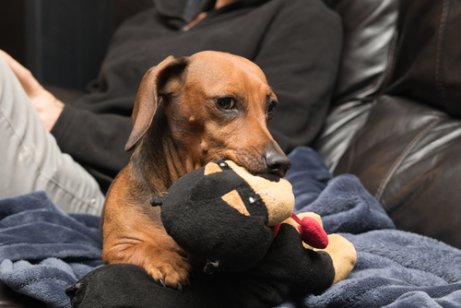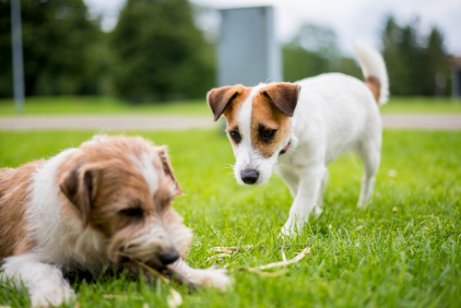Jealous Dogs: Why Do Dogs Get Jealous?

Your dog’s jealousy might be noticeable upon the arrival of a newborn baby or a pet. Do you want to know why? Read this article to find out why dogs get jealous. It’s all related to survival and living within a pack.
Why are dogs jealous?
For pets, jealousy is a matter of instinct. They want to protect their relationship with their owners. So, jealousy nothing to with love, friendship, or anything else. It is something completely natural and unavoidable in dogs.
Many people believe that jealousy is a social construct only among humans. According to humans, a specific emotion is linked to romantic or sexual relationships. However, it can also occur in animals if they sense that another animal might be taking their owner’s affection away from them.
Of course, what dogs experience is unlike what humans experience when they’re jealous. Dogs feel jealousy when they believe their ties to the pack are under threat. For example, a newborn baby in the family could cause your dog to feel jealous because he could see the baby as a rival.
Dogs feel jealous and show it serval ways. They may growl, try to bite the ‘intruder’ or try to get the owner’s attention by bringing him a toy or jumping up on him/her. Other dogs might try to hide behind the opponent or do their best to “get it out of the way”, which isn’t always done in a friendly manner.

How can you identify jealousy in dogs?
You can tell if your pet is feeling jealous by analyzing his behavior and being aware of any changes to the atmosphere in your home. Not all dogs will feel jealous if there is a newborn baby at the house or even a new pet. These additions to the family may not make them feel as if they are being left out either.
In actuality, dogs feel jealousy or envy when they believe they are being treated unfairly. How do you know if your dog is jealous? Here are the main signs:
1. Excessive Barking
When an owner is paying more attention to another animal, baby, significant other or a guest, the dog may begin to bark non-stop. This is commonly expressed through constant “barking” in breeds such as Chihuahuas or Schnauzers.
2. Going to the bathroom inside the house
If your dog is feeling jealous, he may go to the bathroom in the places he knows he isn’t supposed to. He does this to mark his territory or to get your attention.
3. Destroying objects
Your dog may try to destroy his toys, bed, or “steal” your personal belongings (socks, shoes, among other things). This is a cry for attention.
4. Aggressiveness
Another expression of a jealous in your dog is growling, showing his teeth or trying to bite whoever he considers being an intruder. You may also notice other changes in his behavior, such as whining, compulsively licking, refusing to eat, excessive eating and howling.

Tips for Dealing with a Jealous Dog
As mentioned earlier, dogs express their jealousy in several ways. Once you are aware of his jealousy, the next step is to help him not feel sad, anxious, or unhappy. The following are some helpful tips:
1. Give your dog plenty of attention
Even though the arrival of a newborn baby or a pet can take up a lot of your time, you shouldn’t forget about your dog. Even a few minutes of attention a day is enough to make him feel loved.
2. Introduce your dog to the new family member
It’s important for the animal to have contact with the person or animal they consider being a “danger.” First, play with your dog a little and then introduce him to it. Do this gently and pay close attention to his reaction.
3. Give your dog treats
Dogs love to be given new toys or treats. When you get back from being out or spending a lot of time with the “intruder,” give your dog something to show that you care.
The best way to prevent jealousy in dogs is to socialize them from an early stage of life. Whether at the park or at home, they should learn that another animal’s presence doesn’t affect their relationship with you.
Your dog’s jealousy might be noticeable upon the arrival of a newborn baby or a pet. Do you want to know why? Read this article to find out why dogs get jealous. It’s all related to survival and living within a pack.
Why are dogs jealous?
For pets, jealousy is a matter of instinct. They want to protect their relationship with their owners. So, jealousy nothing to with love, friendship, or anything else. It is something completely natural and unavoidable in dogs.
Many people believe that jealousy is a social construct only among humans. According to humans, a specific emotion is linked to romantic or sexual relationships. However, it can also occur in animals if they sense that another animal might be taking their owner’s affection away from them.
Of course, what dogs experience is unlike what humans experience when they’re jealous. Dogs feel jealousy when they believe their ties to the pack are under threat. For example, a newborn baby in the family could cause your dog to feel jealous because he could see the baby as a rival.
Dogs feel jealous and show it serval ways. They may growl, try to bite the ‘intruder’ or try to get the owner’s attention by bringing him a toy or jumping up on him/her. Other dogs might try to hide behind the opponent or do their best to “get it out of the way”, which isn’t always done in a friendly manner.

How can you identify jealousy in dogs?
You can tell if your pet is feeling jealous by analyzing his behavior and being aware of any changes to the atmosphere in your home. Not all dogs will feel jealous if there is a newborn baby at the house or even a new pet. These additions to the family may not make them feel as if they are being left out either.
In actuality, dogs feel jealousy or envy when they believe they are being treated unfairly. How do you know if your dog is jealous? Here are the main signs:
1. Excessive Barking
When an owner is paying more attention to another animal, baby, significant other or a guest, the dog may begin to bark non-stop. This is commonly expressed through constant “barking” in breeds such as Chihuahuas or Schnauzers.
2. Going to the bathroom inside the house
If your dog is feeling jealous, he may go to the bathroom in the places he knows he isn’t supposed to. He does this to mark his territory or to get your attention.
3. Destroying objects
Your dog may try to destroy his toys, bed, or “steal” your personal belongings (socks, shoes, among other things). This is a cry for attention.
4. Aggressiveness
Another expression of a jealous in your dog is growling, showing his teeth or trying to bite whoever he considers being an intruder. You may also notice other changes in his behavior, such as whining, compulsively licking, refusing to eat, excessive eating and howling.

Tips for Dealing with a Jealous Dog
As mentioned earlier, dogs express their jealousy in several ways. Once you are aware of his jealousy, the next step is to help him not feel sad, anxious, or unhappy. The following are some helpful tips:
1. Give your dog plenty of attention
Even though the arrival of a newborn baby or a pet can take up a lot of your time, you shouldn’t forget about your dog. Even a few minutes of attention a day is enough to make him feel loved.
2. Introduce your dog to the new family member
It’s important for the animal to have contact with the person or animal they consider being a “danger.” First, play with your dog a little and then introduce him to it. Do this gently and pay close attention to his reaction.
3. Give your dog treats
Dogs love to be given new toys or treats. When you get back from being out or spending a lot of time with the “intruder,” give your dog something to show that you care.
The best way to prevent jealousy in dogs is to socialize them from an early stage of life. Whether at the park or at home, they should learn that another animal’s presence doesn’t affect their relationship with you.
This text is provided for informational purposes only and does not replace consultation with a professional. If in doubt, consult your specialist.








